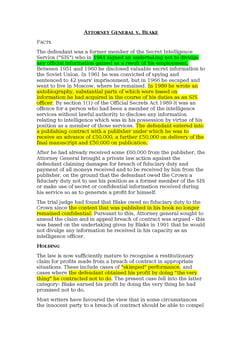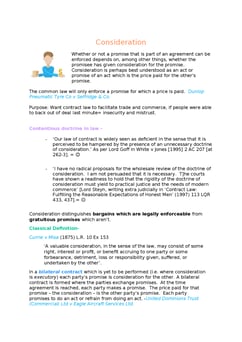Huyton v Peter Cremer [1999] 1 Lloyd’s Rep 620
Judgement for the case Huyton v Peter Cremer
Table Of Contents
Plaintiff agreed to buy goods from Defendant and payment was to be made on presentation of valid shipping documents.
There was some dispute as to the state of the documents of shipping since there were defects in them. Plaintiff agreed to pay a lesser amount than agreed with Defendant and claimed that in accepting this Defendant had accepted a revocation of the arbitration clause in the contract.
Defendant claimed that it had been forced to accept Plaintiff’s reduced offer since it was under economic duress and insisted on its right to invoke the arbitration clause.
Mance J found for Plaintiff, stating that since valid documents were not repented, Plaintiff was entitled to treat Defendant’s attitude as repudiatory and Defendant had no continuing contractual rights after this date.
Therefore there was no illegitimate pressure, while even if there had been illegitimate pressure, there was no causal connection between that and the new agreement.
Mance J
Economic duress = “(i) illegitimate pressure by one party (ii) constituting a significant cause inducing the other party to act as he did”.
-
Mance J support’s Lord Goff’s “significant cause” approach in The Evia Luck. He interprets this as setting up at the very least a “but for” test and that “the illegitimate pressure must have been such as actually caused the making of the agreement, in the sense that it would not otherwise have been made either at all or, at least, in the terms in which it was made. In that sense, the pressure must have been decisive or clinching.”
(NB WRONG interpretation: duress could be a significant cause without satisfying a but for test e.g. where there are several important factors).
He says that the “significant cause” in addition to a “but for test” is required rather than a simple but for test alone, because the latter would too readily grant relief where duress was not a key factor e.g. where someone had a real choice and could have sought legal redress.
It is “difficult to accept that illegitimate pressure applied by a party who believes bona fide in his case could never give grounds for relief against an apparent compromise” though this will be rare.
He justifies the different approach to causation in economic duress rather than personal or proprietary duress on the grounds that the two are distinct: the former can be BF, unlike the others.
RELATED CASES
For Further Study on Huyton v Peter Cremer

These are detailed case summaries (excerpts from cases - not paraphrase...

Shipping and International Trade Law notes fully updated for recent exa...
Need instant answers? Our AI exam tutor is here to help.
Ask questions 🙋 Get answers 📔 It's simple 👁️👄👁️
Our AI is educated by the highest scoring students across all subjects and schools. Join hundreds of your peers today.
Get StartedSimilar Cases
- Dimskal Shipping Co SA v International Transport Workers’ Federation, The Evia Luck
- R v Attorney-General of England and Wales
- North Sea Shipping Co v Hyundai Construction, The Atlantic Baron
- Universe Tankships Inc of Monrovia v International Transport Workers’ Federation (The Universe Sentinel)
- DSND Subsea Ltd v Petroleum Geo-Services ASA
Related Product Samples
These product samples contain the same concepts we cover in this case.


 Since 2010, Oxbridge Notes has been a trusted education marketplace, supplying high-quality materials from top achievers at universities like Oxford, Cambridge, LSE, Harvard, and Yale.
Since 2010, Oxbridge Notes has been a trusted education marketplace, supplying high-quality materials from top achievers at universities like Oxford, Cambridge, LSE, Harvard, and Yale.